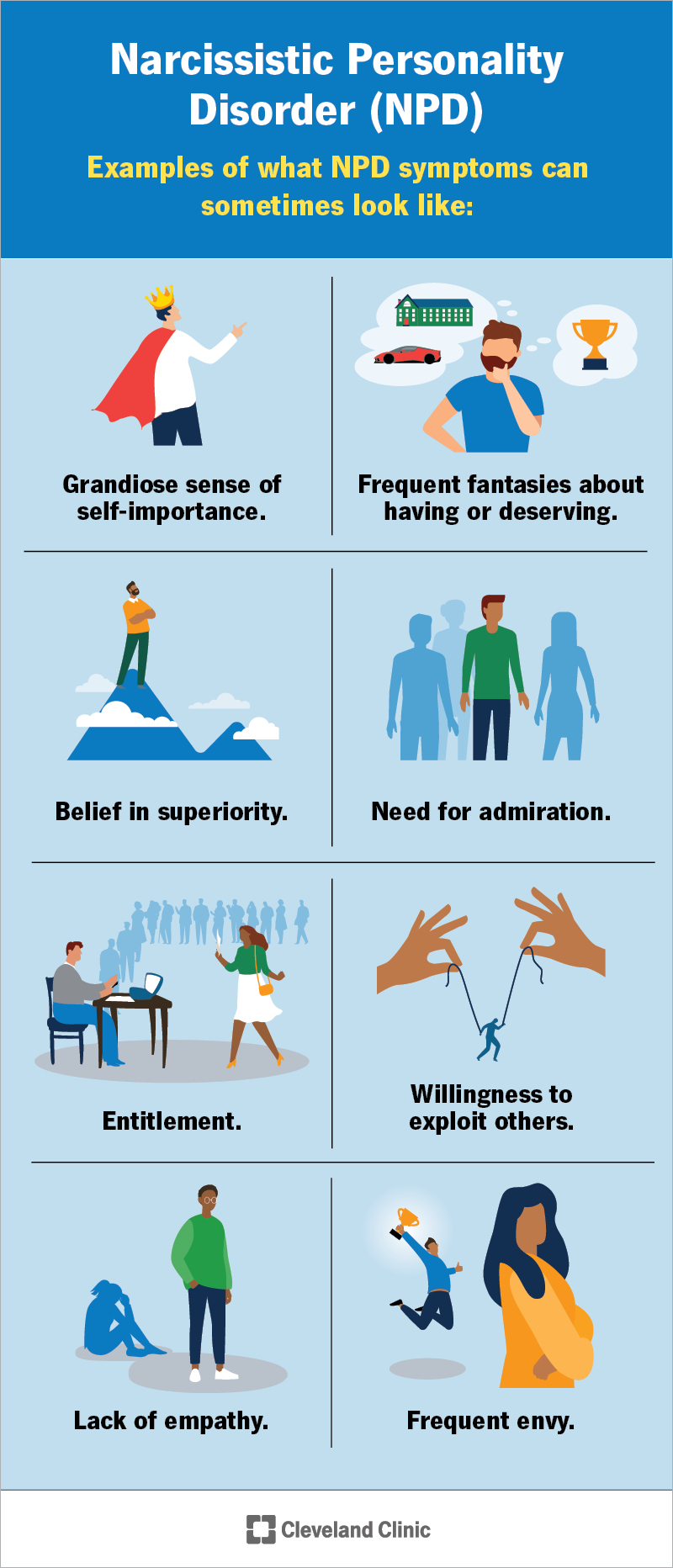Are there different types of narcissism?
The DSM-5-TR (the latest revision of the DSM-5) doesn’t describe different types of narcissism or NPD. But experts often still organize narcissism based on traits or behaviors.
Some of the traits used are:
- Grandiose (wanting admiration or recognition) vs. vulnerable (needing approval to maintain self-esteem or feeling afraid of disapproval).
- Overt (visible) vs. covert (hidden).
- Benign (harmless) vs. malignant (willing to hurt or take advantage of others).
These aren’t formal distinctions, but a mental health provider may tell you about them to help you understand your condition. You can also ask a provider about these traits if you think they apply to you.
Can I take a test to see if I have narcissistic traits?
Providers may use several diagnostic screening questionnaires to help diagnose NPD. While you might feel tempted to take a test online to see if you have it, you should remember that it isn’t a formal diagnosis. You should see a trained, qualified provider to be certain of the diagnosis.
What do I do if I think a loved one has narcissistic personality disorder?
People with NPD may be unable to see its signs and symptoms in themselves. Often, family, friends or loved ones may be the first to suspect someone has NPD. If you suspect someone you care about has NPD, you should keep in mind the following:
- You can’t change someone with NPD. The only person who can change their behavior is themselves. While you may feel frustrated by a loved one’s unwillingness to change, remember that it’s not your fault. You can encourage them to receive care, but they have to want it for this to succeed.
- Stay calm and don’t take things personally. People with NPD may try to antagonize or draw a reaction, especially when lashing out. Don’t take it personally, and don’t respond in kind.
- Set healthy boundaries. People with NPD often consciously or unconsciously try to get what they want by going to others. If you have a loved one with NPD, setting healthy boundaries may be necessary. Make sure you communicate what you’re willing and unwilling to do, and hold fast once you set boundaries. It may be difficult, but giving in to their demands won’t help (and may make things worse).
- Protect yourself. People with NPD often resort to gaslighting (trying to convince you that either you or they said or did something differently) to undermine your boundaries. Keep notes or a journal if you think you’ll need to be certain in the future about what you said or did. They may also lash out (either verbally or physically) out of anger. Be sure to protect your own health and well-being.
- Take care of your own mental health. People who have loved ones with NPD should consider seeing a mental health professional also. Doing so can help you better work through your own emotions and difficulties surrounding NPD, and better prepare you for how to deal with the effects of this condition in a loved one.
- Don’t ignore warning signs. People with NPD have a higher risk of dying by suicide. If you suspect a loved one with NPD is withdrawing or considering harming themselves, talk to them directly. Call 911 (or your local emergency services number) immediately if you think they’re in imminent danger.
A note from Cleveland Clinic
Narcissistic personality disorder isn’t a flaw or a character defect. It’s a mental health disorder. If you have it, there are things you can do to help yourself and strengthen your connections to others in a healthy way. It may be difficult to accept or admit, but this condition can seriously damage relationships and disrupt your life. You shouldn’t ignore it or avoid the reality of it.
If you know someone with NPD, learning about it can help you take care of yourself and try to help them. Sometimes, the best thing you can do is establish boundaries and not engage. Remember that you can’t force someone with NPD to change. They have to be willing to do so.







